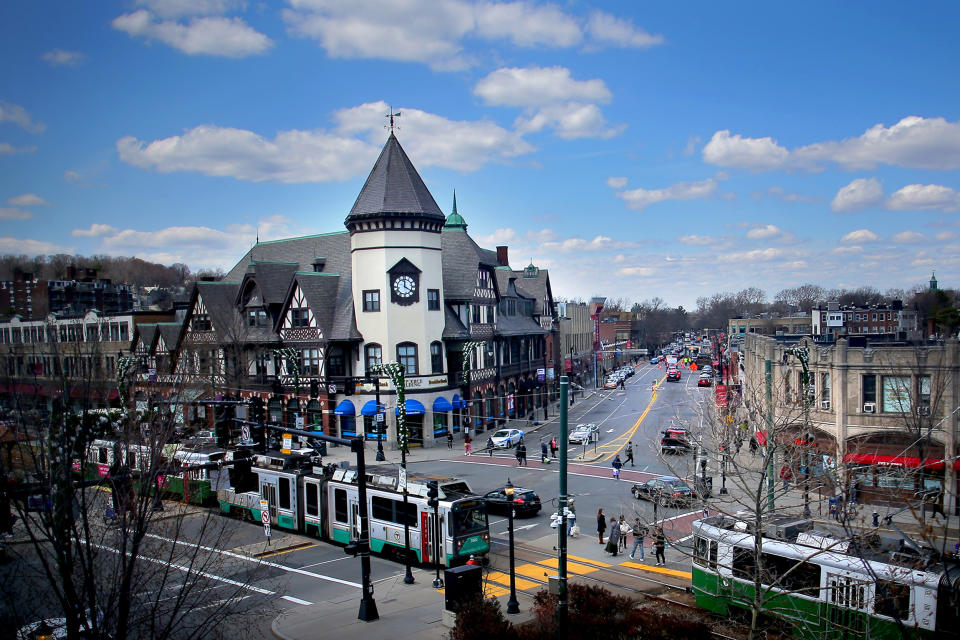'Long overdue': New Zealand models generational tobacco purchasing ban on a U.S. suburb
As New Zealand gears up to introduce one of the world’s toughest anti-smoking laws, a similar ban has already been instituted nearly 10,000 miles away in a Boston suburb.
Earlier this month, New Zealand unveiled its plan intended to stop young people from ever smoking in their lifetimes.
The legislation, which includes other curbs on smoking, would make it illegal to sell or provide tobacco products to people born after a certain date.
Under the proposal, starting in 2027 New Zealand’s legal smoking age of 18 would be raised year by year, allowing existing smokers to continue buying tobacco products but effectively making them off-limits for anyone born after 2008.
The proposal would make New Zealand’s retail tobacco industry one of the most restricted in the world.
But it is not the first place to experiment with an age-based tobacco ban.
In Brookline, Massachusetts — a wealthy suburb within walking distance of the Boston city limits — a bylaw that went into effect in September forever prohibits anyone born after Jan. 1, 2000, from purchasing tobacco and vape products. That means that people who this year turned 21, the legal age in Massachusetts for buying tobacco, are unable to do so in Brookline.
The idea is part of the same “tobacco-free generation” movement that New Zealand is working to achieve, said Katharine Silbaugh, a co-sponsor of Brookline’s ban who is a professor of law at Boston University and an elected official in Brookline’s town government.
She said she and others who fought for the Brookline regulation have been in touch with advocates in New Zealand as they hammer out their national plan.
“There are definite benefits to doing what they’re doing because a person who’s really determined to buy tobacco can go across town lines here,” she said. “But there is terrific evidence that accessibility to substances increases use, so it’s not the case that what Brookline did will have no effect. It will have an effect.”

While united in their goal of phasing out tobacco use, Brookline and New Zealand face different challenges.
Brookline’s bylaw applies only to the predominantly white town of around 60,000 residents, which has a median household income of about $117,000. Local legislators approved it in November 2020 by a vote of 139 to 78.
Tobacco use isn’t much of an issue in Brookline to begin with: 6.8 percent of adults smoke, half the rate of smokers statewide, according to the Massachusetts Tobacco Cessation and Prevention Program, which is run by the state Department of Public Health.
New Zealand’s plan has been proposed for the whole country of more than 5 million, where as of last year 11.6 percent of all people 15 and older smoked. The proportion jumps to nearly 29 percent among Indigenous Maori adults. The government’s goal is to reduce the overall number to below 5 percent by 2025.
While applauded by health advocates, the plan has received pushback from politicians and advocacy groups in New Zealand who see it as excessive state interference that will hammer businesses.
Sunny Kaushal, who heads an organization that represents small-business owners, predicted a “devastating impact” on convenience stores.
Citing figures from Z Energy, a gas station retailer, he said that tobacco accounted for almost half of in-store sales.
Kaushal said that his organization supports the initiative, but felt that businesses affected should be compensated.

In Brookline, financial concerns loom large among small businesses too — but more because they fear customers will simply drive to the next town to buy tobacco products.
‘On the front line’ of customers’ frustrations
Elias Audy and his son own two Mobil gas stations in Brookline. They said they project a significant revenue loss that goes beyond tobacco sales, since customers who go elsewhere to buy cigarettes are likely to buy their gas and other items there as well.
“This is really where the impact is going to be felt. It’s going to be felt two or three months from now, when people start shifting to other locations outside of Brookline to get their cigarettes, their gas, their water bottle, their chips,” he said.
In a way, a ban that applies nationwide would feel more fair than Brookline’s bylaw, Audy added.
“It’s not statewide. It’s not nationwide. It’s just Brookline. I think the town of Brookline is picking on the type of industry we’re in,” he said.
His son, Omar Audy, said he worried that customers might take out their anger over the ban on store employees.
“Why can’t they buy a cigarette pack at 21 when they can go to a bar, they can go to nightclubs? It does not sound right at all,” he said. “It sounds like the town has taken their civil rights away and put us on the front line of dealing with their frustration.”
The ban has prompted several of Brookline’s small-business owners, including Elias Audy, to band together to sue the town in an effort to overturn the policy, arguing it conflicts with state law and discriminates against patrons based on their birthdates.
“You are literally discriminating against someone for the day they’re born,” Adam Ponte, an attorney representing the plaintiffs, said. “You almost wear this badge for the rest of your life.”

Silbaugh, the co-sponsor of Brookline’s bylaw, is optimistic the ban will have less of an effect on businesses than what the Audys and others fear.
“Every existing customer they have right now remains an existing customer,” she said. “All they lose is the ability to develop new business with people who are 21 and younger.”
She’s hopeful that the ban eventually extends beyond Brookline so the Audys don’t have to watch customers go elsewhere to get their nicotine fix.
The New Zealand proposals, which also include lowering nicotine content in tobacco products and reducing the number of retailers authorized to sell them, are set to be debated in Parliament in the coming weeks. The governing Labour Party’s majority means that the legislation, which does not affect the sale of vaping products, is likely to pass.
The move has received support from a range of experts in New Zealand, including those at leading Maori public health provider Hapai Te Hauora, which described the announcements as “long overdue.”
But the libertarian ACT party described the initiative as a “nanny state” move reminiscent of the United States’ experiment with Prohibition in the early 20th century.
“Eventually, we will end up with a black market for tobacco,” Karen Chhour, a party spokesperson, said.
She argued that reducing nicotine content in cigarettes could backfire, leading smokers to buy more of them to achieve the same effect.
Lucy Elwood, CEO of the Cancer Society of New Zealand, said the proposed measures were “evidence-based” and that nicotine reduction works because people smoke more in the first few days, then lessen their consumption.
The plan is “something of an experiment,” said Professor Chris Bullen, director of the National Institute for Health Innovation at the University of Auckland. But he said that, given the likely public health benefits, “the tobacco control, research and advocacy community is fully behind the government in taking some quite innovative approaches here.”
Tobacco giant Philip Morris International said in a statement that it was reviewing New Zealand’s proposal.
In Brookline, Silbaugh said she felt that age-based tobacco restrictions are a “win-win.”
“As we’ve crafted it, no one who can currently buy tobacco will ever be prohibited from buying tobacco,” she said. “It really only affects the future.”

